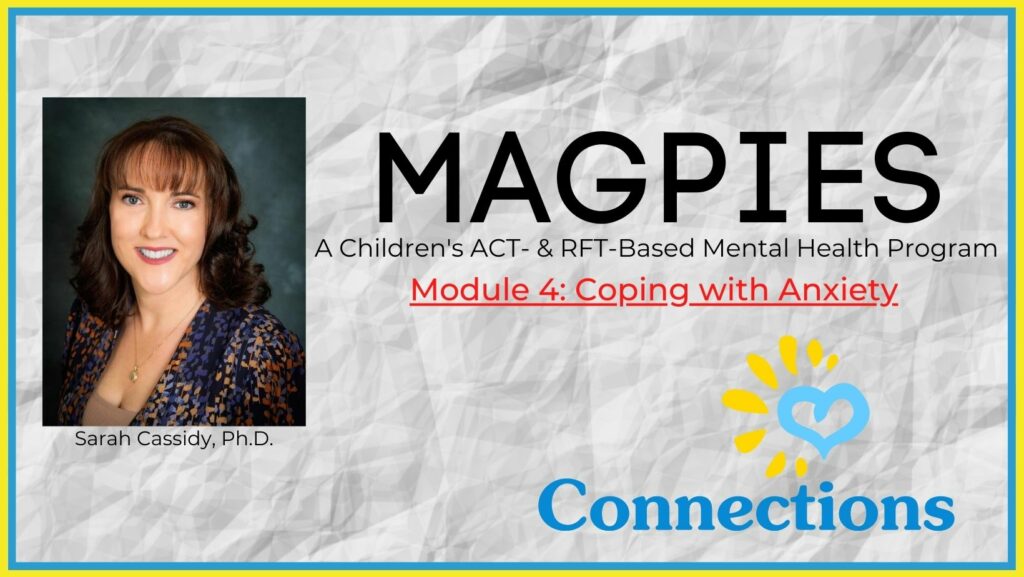Connections Behavior Planning and Intervention welcomes Sarah Cassidy, Ph.D., for a webinar introducing the MAGPIES program. This is the final of four modules, focusing on applications to Anxiety in young learners. Recordings are available for earlier sessions, pertaining to Emotional Regulation, Social Skills, and Self Esteem.
Abstract
There are now 1000 randomised control trials demonstrating the efficacy of Acceptance and Commitment Therapy (ACT). ACT is rigorously behavioural but is based on the comprehensive empirical analysis of human language and cognition, also known as Relational Frame Theory, RFT (Hayes, 2004). However, ACT for youth with specific emotional and behavioural difficulties is still in the early days. In addition, whilst many basic scientists study RFT in the lab, many clinicians have struggled to understand and to integrate RFT and ACT into clinical interventions. In addition, while ACT is often hailed as a transdiagnostic approach, there are some common difficulties discussed in mainstream psychology that fail to get adequate attention from the behavioural community (e.g., emotional dysregulation, low self-esteem, poor social skills, and anxiety). This is partly as a result of the mentalistic language often used in mainstream psychology but also to the sometimes lack of agreement relating to working definitions of what these difficulties are functionally comprised of. In turn, this leads to a poverty of therapeutic intervention for children with a wide range of emotional behavioural difficulties or neurodevelopmental differences in mainstream school settings at a time when behaviour analysts have a wealth of technique which could prove very effective for treating these very common presentations.
The MAGPIES programme was designed firstly to attempt to more functionally understand some common presenting complaints in children by breaking down these issues into component skill areas. Secondly, the programme was designed to treat these issues in systematic ways with easily to implement protocols and strategies that teachers/clinicians/care staff can deliver in naturalistic settings effectively. However, the MAGPIES programme also aims to deliver this skills based programme in ways that are neuroaffirmative, compassionate and respectful of children’s differences.
Data collection is ongoing and is being collected across four separate 8 week modular blocks of the programme’s implementation. The groups are devised to teach emotional regulation skills, to build self-esteem, to promote coping with anxiety and to build social skills and self-awareness. While the model is firmly rooted in the key ACT process of facilitating psychological flexibility, this programme also explicitly integrates RFT within the therapy protocols.
This webinar series highlights the need to work closely with statutory services and focus on what education and health service systems deem important to address. Research is ongoing and current and emerging data sets will be discussed. Webinar four will focus on teaching children how to cope with anxiety. This Module is important because children often receive lots of messages about anxiety and what having anxiety might mean about them (e.g., “you must be abnormal”, “this is a sign you’re broken”) and how they should respond to it (e.g., “don’t worry”, “just think positively”). This makes working with anxiety particularly challenging, and many professionals can find themselves stuck; “My child says no strategy works for them”, “I’ve prompted acceptance, now what?”, “Have I evoked acceptance OR just avoidance that happens to look like acceptance?”
This workshop introduces attendees to MAGPIES, a school-based, developmentally appropriate, ACT and RFT program, that teaches children ways to effectively respond to anxiety. Through didactic presentations and experiential exercises, attendees will hone their skills in function-spotting and creative hopelessness; making space for children to explore the workability of their current anxiety-management strategies. Attendees will further be guided in framing anxiety as a cue/signal for the young person’s values; transforming an unwanted experience into an opportunity to connect with what matters. Attendees will also receive a suite of easy-to-implement MAGPIES protocols that teachers/clinicians/other professionals can use to shape effective responses to anxiety in naturalistic settings.
Learning Objectives
- Explain ACT and RFT-consistent ways to approach anxiety in childhood (e.g., acceptance, self-as-distinction, etc.).
- Plan for challenges that may arise when working with anxiety with children within the ages of 8-12 (e.g., when a child says nothing seems to work).
-
Practice exercises from the Anxiety module with modeling and feedback from the trainer.
Number of CEU’s available: 2.0 BACB Learning CEU’s
Cost to Attend: $39.99 (includes registration and CEU’s)
For questions, challenges with registration, or any other needed information, please contact Dusty, Director of Continuing Education and ACE Coordinator for CBPI, LLC, at continuingeducation@connections-behavior.com.
Connections Behavior Planning & Intervention, LLC, is a BACB-Approved ACE Provider (Provider # OP-17-2781). The BACB does not directly sponsor or endorse this event, its speakers, or its content.
SEPTEMBERSALE
Login to Register
Please log in or register before registering for On-Demand items.

